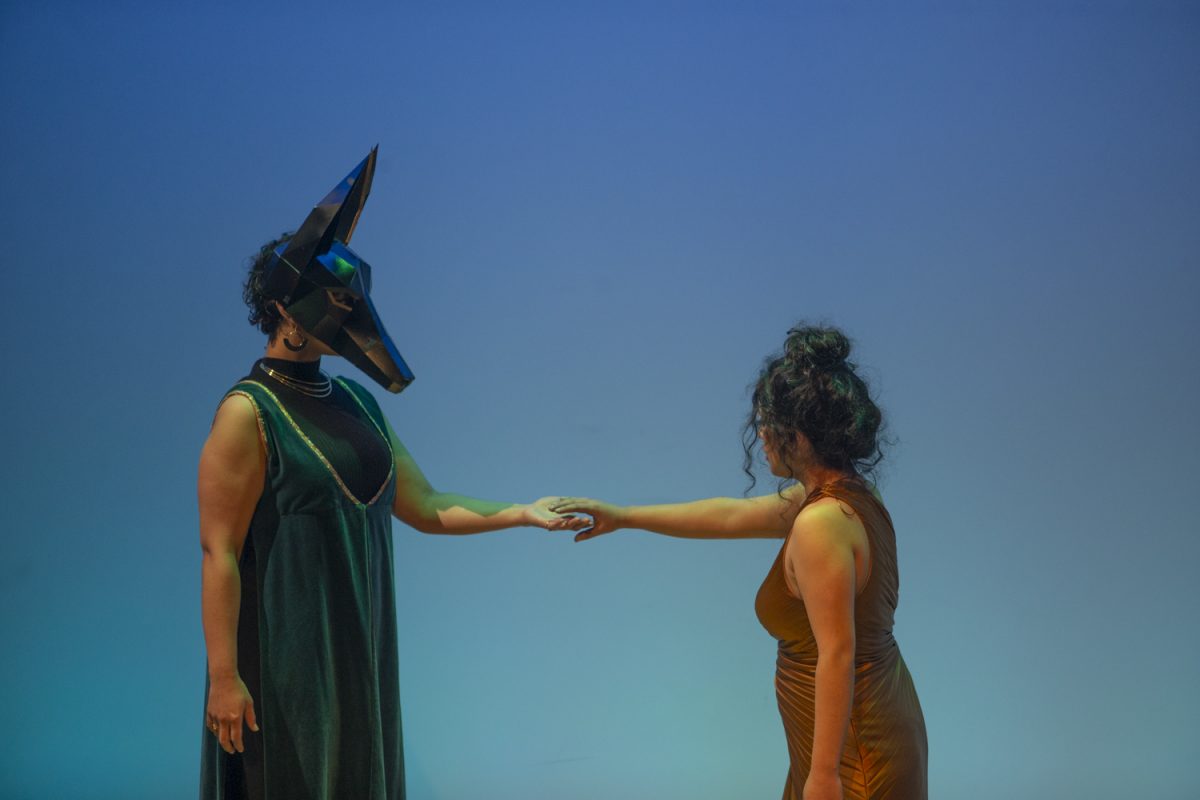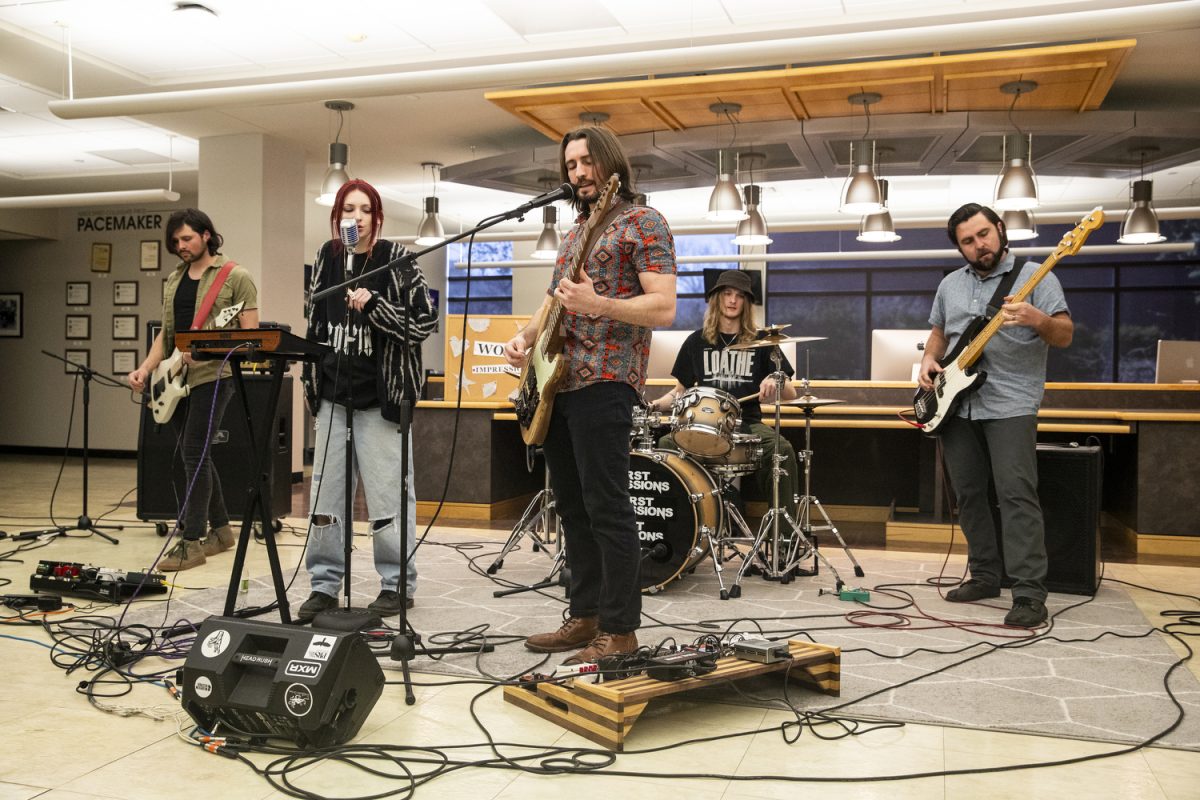Eight women stand shoulder to shoulder on a cold cement floor. Their voices mingle and bounce off the barren, gray walls. They are welcoming, beckoning anyone who will listen to take a ride on a train through their lives.
Theresa Meeks-Mosley, 46, steps forward. Her voice rings through the empty space: “Go inside yourself. Find a speck, a splinter of beauty to be grateful for.”
Mosley is a stay-at-home mother who lends her voice to the new play Now and Then My Country, which will première at 8 p.m. Friday at Public Space One, 129 E. Washington St. An additional show will take place at 8 p.m. April 28. Admission is free.
This is not an average community-theater production. The script was written by 14 women, 13 of them incarcerated.
“The line between us walking around and the women in prison is very fine,” Meeks-Mosley said. “You want to think that it couldn’t happen to you or your sister or mom, but it could.”
The play was written during eight weeks last fall at the Iowa Correctional Institute for Women in Mitchellville, Iowa. Lisa Johnson, a graduate research assistant in the University of Iowa School of Art and Art History, led the workshop for the prisoners.
“We started with the idea of home,” she said. “Look at what it is personally to each woman through the lenses of her mother, father, different experiences.”
The play follows a disjointed path, an eclectic collection of anecdotes that the inmates primarily wrote. Some are playful, remembering favorite childhood memories such as jumping rope and riding tricycles in the driveway. Others are dark, dealing with traumatic events: rape, abuse, abandonment.
But the play builds toward creating a new world for the women, a collective country.
Numerous art-education experts have said allowing prisoners to express themselves artistically fills an important void.
“One thing about being human is having spaces in which you can play, imagine, and experience things that are not tangible,” said Rachel Williams, an associate professor of education who has more than 15 years of experience working in prisons. “Getting people to recreate themselves through creativity and imagination are safe ways to allow people to ask, ‘What are other ways to be?’ ”
And rehabilitation through the arts is something Mary Cohen stresses. The UI assistant professor of music education has eight years of experience bringing music education to Iowa prisons, most recently creating a community-member and inmate choir at the Iowa Medical & Classification Center, in Oakdale.
“Ninety-five percent [of prisoners] will be released, and when you are in prison, it is very easy to learn to be a smarter criminal,” Cohen said.
Adding arts into the inmates’ lives helps them grow positively before being released, she said.
“Would you rather have people released with hope in their hearts or hate in their eyes?” she asked.
The 13 inmates who collectively penned the script are in prison for many crimes, ranging from drug possession — some carrying a sentence of less than one year — to life in prison for murder, Johnson said.
“I don’t know what most of them are in there for, because we hardly talk about it. I just don’t care,” Johnson said. “I feel they get enough chances to talk about that. A lot of people want to go in there, and volunteer, and say, ‘Let’s talk about your crimes and why you are sorry.’ The women are in there, they are sorry. It is kind of an old story.”
After the script was written, the women performed the play for their fellow inmates — Johnson asked that the parts be acted without costumes or theatrics in order to let the words stand on their own. But one woman couldn’t.
“All through rehearsal, I asked her to please do the story in her own voice, because many of the times, she added layers that it did not need, adding accents or posture changes,” Johnson said. “That was really presentational but not showing her true self.”
But during a final run-through, while hunched over and talking in an altered voice, she stopped, straightened up, and proceeded to tell the rest of it as herself.
“The ownership of the story, the willingness to tell it, that was the most beautiful theatrical thing I have ever seen,” said Johnson, touching her hand to her heart. “It was there, that moment of catharsis. A real moment of change.”
The emotional change is something she and her colleagues don’t take for granted.
“There are so many psychological layers in dealing with prisoners that makes it crucial that mutual respect and honesty pervade the whole process,” said Eric Forsythe, a UI professor of theater who has also spent time working with inmates. “It is a hugely demanding project.”
And for Johnson, this particular project is reaching its climax.
On Sunday, she watched the eight performers run lines for hours. The air was hot. Two oscillating fans fought feebly to cut through the heavy air. It was the first time the cast had come together to prepare for opening night.
For some of the women, theater has been a constant in their lives, but for Kathy Nolan, a 48-year-old legal secretary, this is her first foray into acting.
“The reason this project intrigued me is, for me, the only reason I am not where they are is because I didn’t get caught,” she said. “I feel as if I have a responsibility to carry their stories.
“I guess in the same way, I think people in general are not aware of how close they are to being homeless; it just takes a shift in circumstances. You can have a shift of circumstances in breaking the law, or crossing the line, and getting caught up in a situation that goes beyond your control. Right or wrong.”
This “fine line” between being free and being locked away is something most of the cast members expressed a connection with.
“I think [the play] really lets the story be told, that a lot of times the perpetrators are also victims,” said 36-year-old Amanda Murphy. “We all have good and bad things about us; we are all just human beings.”
And that humanity is what the cast said it hopes to have on full display Friday.
“I want [the audience] to remember that [the prisoners] are still women,” said UI senior Caitlin Hurban. “A lot of times, people only care about who they are now, not what happened when they were little. Just think about them in the abstract, rather than the fact they are actually people.”
While much of the play delves into traumatic pasts and somber memories, Meeks-Mosley noted why the play is important.
“We talk about these things because they are our stories,” she said, delivering her line, her voice powerful, sharp, unwavering. “I want to show you what I remember.”






